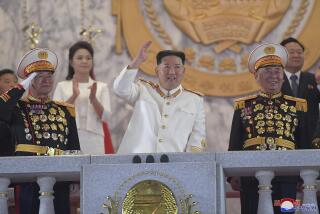Remembering the Forgotten War
- Share via
The Korean War began at dawn on a rainy Sunday 50 years ago today with a cross-border attack by Communist North Korea that quickly overwhelmed the weak South Korean army. It ended in a military stalemate more than three years later with both countries in ruins and an estimated 3 million dead, many of them civilians.
The war came to involve 21 countries, including the Soviet Union, which provided surreptitious air cover for the Chinese and North Korean troops that were battling U.S. and other forces mobilized under U.N. auspices. At the end of the fighting there would be almost 37,000 Americans listed as killed in action, more than 8,100 missing and some 103,000 wounded. It was a terrible price to pay for this nation’s post-World War II retreat into military unpreparedness, complacency and the illusion that nuclear weapons and air power alone could deter aggression and assure peace.
Korea was the first great conflict of the Cold War, and its first great miscalculation. North Korean dictator Kim Il Sung, whose son and successor has now begun to turn a benign face to the world, had persuaded his Soviet patron, Josef Stalin, that he could win a quick and cheap victory that would extend Communist rule to all of Korea. He almost succeeded.
President Harry S. Truman tried to halt the invasion with U.S. air and naval forces. Within five days he was compelled to commit the first of what would become hundreds of thousands of ground troops to keep all of South Korea from being overrun. It was a painful rediscovery, as the historian T.R. Fehrenbach wrote, that “if you desire to defend [a land], protect it, keep it for civilization, you must do this on the ground the way the Roman legions did it, by putting your young men into the mud.”
American forces fought in mud and snow and fetid heat in a seesaw war that would involve massive intervention by China and years of frustrating negotiations before an armistice was finally signed. At the end the two Koreas, for all they had suffered, would control essentially the same territory they held when war erupted.
Korea is not a war that the history books linger over. Unpopular while it was being fought, it was quickly forgotten by most Americans, save those who served there and their survivors. It deserves more.
Truman’s decision to intervene proved a turning point in the Cold War. It preserved South Korea’s independence. It led directly to the buildup of U.S. forces under NATO, providing a counterweight to Soviet power that assured security in Western Europe. South Korea has evolved from an impoverished and authoritarian state into a democracy whose thriving economy is now the world’s 12th largest.
A half-century after the onset of that brutal and destructive civil war, the two Koreas may be groping their way toward detente. It’s too soon to gauge how far this process might go, and certainly it’s too soon to begin thinking about withdrawing the 37,000 U.S. troops that remain stationed in South Korea, an earnest of America’s intentions to stand by its allies and of key importance in maintaining a balance of power in Northeast Asia.
For Washington, North Korea remains an enigma and a paradox, politically anachronistic, economically weak and pathetically backward, but still worrisome enough to encourage dubious plans to spend $60 billion to counteract Pyongyang’s so far nonexistent nuclear missile threat. In early 1950 Korea seemed of such little consequence that Washington planners publicly placed it outside the U.S. defense perimeter. Today, ironically, it is more than ever a major focus of strategic concern.
More to Read
Sign up for Essential California
The most important California stories and recommendations in your inbox every morning.
You may occasionally receive promotional content from the Los Angeles Times.













